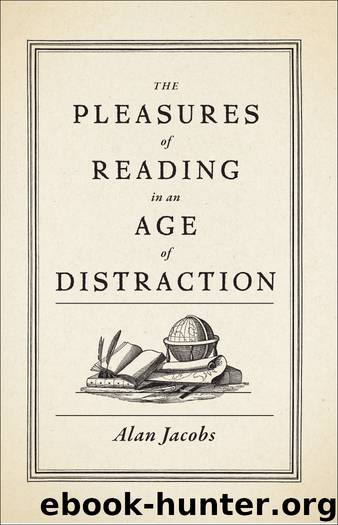The Pleasures of Reading in an Age of Distraction by Alan Jacobs

Author:Alan Jacobs
Language: eng
Format: epub
Publisher: Oxford University Press, Inc.
Published: 2011-07-10T16:00:00+00:00
1. (Chiefly in translations from Latin): Affection, friendliness, devotion to another’s welfare; partisan sympathy; desire, inclination; pleasure or interest felt in something—NB: All these meanings are obsolete since 1697.
So the student of something is (or potentially was, before 1697) not just attentive to what he or she studies, but positively disposed toward it: friendly, even affectionate. The student values the well-being of what he or she studies, wishes for it to flourish. The reader attends to the work itself and the valuable contents therein.
Those valuable contents can only be retrieved, however, by the patient and careful reader. Such a reader must certainly practice cogitatio, must cogitate on the text, that is, intellectually discern its meaning as best he or she can. But this is not enough, because, to return to a point we emphasized earlier, such reading is purely reconstructive and therefore nonresponsive. The genuine student will move on from cogitatio to meditatio, meditation, which for Hugh means “incorporating” the text—if the text is truly worthy, which the serious reader will discern—into the reader’s own experience. Randall Jarrell, we may recall, says that the book we read at Whim says to us, “You must change your life”: David Copperfield likewise was reading not just for entertainment but “for life” itself. He was being changed, enriched and strengthened and consoled, by what he read.
Let me risk one more Latin word here: for Hugh this meditation, especially on sacred texts, could best be achieved by ruminatio, a word which may call to mind something rather more highfalutin’ than Hugh intended. For us to “ruminate” is to engage in a pretty dignified, or dignified-sounding, act, but Hugh was thinking of cows and goats and sheep, ruminant animals, those who chew the cud. A ruminant beast has multiple stomachs, the first of which, the rumen, can be used for temporary storage: the animal chews some food and swallows it, sending it to the rumen, but then regurgitates the partially digested lump and chews on it some more. Only after rumination does the food get passed to the next stomach, from which there is no return. Hugh believes this is the perfect model of attentive reading: to read the text, to pass it along to the depths of the mind—but then to call it back for further thought. (Hugh’s model of reading is notably and consistently physical: he wants to train our bodies to be our assistants in reading, surely because he knows what John Self learned, that bodies have a natural propensity to interfere with still and quiet attentiveness. To “incorporate” is literally to take into the body.) If you have ever read a passage and only later realized that you may not have understood it, and have therefore returned to reread it, you are a ruminant reader.
However, as we have seen, powerful cultural and psychological forces inhibit any ruminant instincts we might have. If we are easily distracted, or in a hurry, or if we are wanting to get a book read so
Download
This site does not store any files on its server. We only index and link to content provided by other sites. Please contact the content providers to delete copyright contents if any and email us, we'll remove relevant links or contents immediately.
| Booksellers & Bookselling | General |
| History of Books |
4 3 2 1: A Novel by Paul Auster(12375)
The handmaid's tale by Margaret Atwood(7757)
Giovanni's Room by James Baldwin(7326)
Asking the Right Questions: A Guide to Critical Thinking by M. Neil Browne & Stuart M. Keeley(5758)
Big Magic: Creative Living Beyond Fear by Elizabeth Gilbert(5754)
Ego Is the Enemy by Ryan Holiday(5413)
The Body: A Guide for Occupants by Bill Bryson(5080)
On Writing A Memoir of the Craft by Stephen King(4935)
Ken Follett - World without end by Ken Follett(4723)
Adulting by Kelly Williams Brown(4565)
Bluets by Maggie Nelson(4547)
Eat That Frog! by Brian Tracy(4525)
Guilty Pleasures by Laurell K Hamilton(4439)
The Poetry of Pablo Neruda by Pablo Neruda(4097)
Alive: The Story of the Andes Survivors by Piers Paul Read(4018)
White Noise - A Novel by Don DeLillo(4002)
Fingerprints of the Gods by Graham Hancock(3996)
The Book of Joy by Dalai Lama(3976)
The Bookshop by Penelope Fitzgerald(3844)
